If you are caught relatively unprepared for a major emergency, just about anything you’re lucky enough to be carrying will have to do.
Unfortunately, this potential also increases the risk of injury and death even if the situation is short term or minor. While every day carry gear has a necessary and vital place in every prepper plan, you must also think about solutions that will allow you to bug out or stay put and still be able to access larger caches of supplies and tools. An emergency tiny house is a good option that you can try building before a disaster strikes.
Tiny Houses vs Camp Trailers
Today, the tiny house craze is sweeping the nation regardless of income level and political affiliation. Many people that want to “downsize” find the idea of living in a one room home far more appealing than living in an apartment. Others are interested in tiny houses because they are far less expensive than a full sized home and can be easily customized to match various themes and interests.
In this case, if your interests are primarily prepper related, you can start with a basic tiny house design and merge it with the best of camp trailers and other miniaturized travel and storage area solutions. When it comes to prepper need, the biggest drawback to tiny houses is they are not easy to travel with. That being said, a poorly designed camper can also be very hard to navigate with.
Click here to get your guide to a layered survival defense!
At first glance, camp trailers have several advantages over tiny houses. To begin, they are made to be mobile. If you do some research, you may even find a second hand trailer that someone wants to get rid of for free or a very low price. As long as the undercarriage and support structures are sturdy enough, you can use that as a basis for either a more tiny house oriented design or simply leave it as a camp trailer design. Camp trailers also have the advantage of fading into settings where a tiny home would stick out. For example, if you are traveling in something that looks just like a small home, people may pay more attention to it than if they see something that looks like a beat up old camper.
Unfortunately, there are also some serious problems with camp trailer designs. First, they are notoriously hard to defend, and also tend to have very thin walls. Tiny houses are usually more durable in the coverings and also can be adapted more easily to meet different needs. This includes modifying them to meet a wider range of weather conditions as well as adding modules or removing them if more or less space is needed.
Before You Begin
Before you begin planning to build your tiny house, it is very important to have a clear set of goals in mind. For example, if your prepping plans are more focused on supplies as opposed to actually living in the structure, then your design options will vary considerably.
It is also very important to consider the following:
- What kind of disasters do you expect to get through with the tiny house? Fires, hurricanes, floods, and shootings all require different building materials. By the time you factor in weight and mobility related issues, you may have to give a lot of extra thought to the materials used as well as some understandings about when the house may or may not be of use to you.
- What kind of laws are you going to be dealing with in your area as well as in any location you will travel through or be staying in? While most places will still allow you to keep a camp trailer in your yard, they may not be so allowing of a tiny house. Even though there is always a potential for a vast and complete social collapse, the time before that can be just as, if not more troubling. Regulations that are imposed to prevent people from living long term in camp trailers and tiny homes must be investigated and overturned. It is up to you to use both the power of the vote and the power of your wallet at state, local, and federal levels to ensure laws suitable to your ambitions are put into place.
Making Sure You Can Travel With the Trailer
Even though you may be determined to bug in or not move away from your local area, there are times when you will have no choice but to leave. Under these circumstances, knowing you have a non-mobile tiny house filled with your stockpiled goods can make your situation worse because you will be more tempted to delay evacuation. If you cannot afford a lot of high quality materials, at least do your best to start off with a frame and undercarriage that will be suitable for transport.
Try choosing a design that will allow you to modify the upper portion while leaving the undercarriage mostly intact. This will enable you to exchange wall materials based on need, or even completely remove the walls. For example, if you don’t have to evacuate, but must deal with a blizzard, then you will want to exchange thinner wall materials for more insulated ones. If you are concerned about a nuclear fallout situation, or gunfire, then make sure you can easily put bags of dirt around, under, and on top of the house.
In a worst case mobility oriented scenario, you should be able to remove the upper portion and cover the frame with tarp or canvas. With the exception of the undercarriage and frame, make it your business to build a tiny home that can be readily scaled to a lesser weight so that you can use different vehicles to tow it as well as navigate through different kinds of terrain.
Depending on your interests, you may have already decided to put a foxhole or some kind of underground bunker that is accessible only from beneath a tiny house. If you go with this option, make sure that you can still easily lift the frame and load it onto a wheeled assembly. Do not forget to look into manual pulley systems and hoists that can be used in a time when more complicated equipment is unavailable. Once you have the trailer built, it never hurts to practice moving it around and making sure that you are fully prepared to achieve this goal in a minimal amount of time.
How to Choose a Blueprint
When you think of both trailers and tiny houses, square or rectangular shapes[1] may come to mind first. Unfortunately, squares and rectangles are the least efficient structures for both housing and storage. Geodesics or curves structures will always work better, especially if you are looking for an energy efficient structure that will withstand a wider range of weather conditions.
Here are some different shapes that you should consider when searching for a blueprint:
- Teardrops[2] – Basically, these designs feature a flat bottom that can be easily mounted on a trailer frame. The roof of the trailer may feature a central curve, or one that leans towards the back or front. Most designs also feature flat sides. Teardrop designs[3] can easily be modified to fit sunroofs, open glass areas for a portable greenhouse without sacrificing an aerodynamic design that will be easier to transport.
- Geodesic Pods[4] – The Life Pod and similar designs are fairly new, however they still have many advantages of a conventional box design. As with teardrop designs, they have better aerodynamics, which will more than likely make it easier to tow them. If you have ever hauled a camper trailer around, even a fairly small one, you know just how nerve wracking it can be to have a box shape swinging from side to side behind your vehicle. Curved shapes may not completely solve that problem, but it does help. Depending on the design that you choose, a geodesic pod can also be towed by a regular vehicle. If you do not have a sturdy truck, but do have a reasonably good car, this design may be your best option. Once you get the blueprints for a geodesic, I also recommend building in a means to “flatten” out the curves when the vehicle is no longer in motion, as well as swap out solid wall areas for glass or plastic. Variable shapes can make it easier to camouflage this tiny home design as well as make it easier to achieve a wide range of goals.
- Yurt Trailers – This design features rounded walls and a conical top. These structures can be built easily enough with canvas and will still travel fairly well. While they can be very energy efficient and lightweight, yurt designs may be harder to adapt if you want to swap out more durable wall materials. While a geodesic pod can also be very easy to notice, at least you can disguise the shape. On the other hand, it is very hard to modify the rounded shape of a yurt trailer.
- Pioneer Style Wagons – Many people seeking to build camping trailers or mobile tiny homes often forget about the fact that our ancestors were able to travel all the way across the country pulling a “home” with a pair of horses or mules. If you are looking for the ultimate in lightweight, simple, and inexpensive, then do some research on horse drawn covered wagons. Not only did the early settlers move across the country using less towing power than you will find in modern cars, they also managed to take along all of their belongings and shelter in the wagon as needed.
Choosing Your Tools
It is difficult to say which tools will serve you the best because there are so many different materials that you are likely to use. If you decide to purchase a pre-made trailer carriage, then you will not need to concern yourself as much with metallurgy and associated tools. Unless you are an experienced welder and know how to join pieces of metal together for optimal strength, I do not recommend building the undercarriage on your own.
Beyond that, here are some tools that you might find useful:
- Circular saw
- Jigsaw
- Rotary tool
- Power stapler and nail gun
- Reciprocating saw
- Air hammer/air powered tools
- Power drill
- Assorted hand tools – hammers, handsaws, hand drills, chisels, axes, and other hand tools will always come in handy for assembling and repairing a trailer.
Many people that are interested in building a tiny house or camping trailer look to battery powered tools because they think they are more versatile. Unfortunately, I have yet to see a battery powered tool that has both the capacity and the consistency of plug based tools. Before you invest in a battery powered tool kit, try a sander or a jigsaw to see how you like the device. Make it a point to compare using the battery powered tool with a handsaw or compatible hand tools. You may be very surprised to find that you can do better by hand.
The bottom line is if you want maximum efficiency, I do recommend using either plug based power tools or air powered tools. Insofar as air powered tools, do not be fooled by the tire inflaters or the compressors that will only release air into a tank. You will need a tank that holds at least 15 gallons and a compressor that also has an air hose port so that you can power tools directly instead of drawing from the tank. While a good air power tool system will take up more room than a batch of battery powered tools, this system is still highly portable and will supply plenty of power for most jobs.
Acquiring Materials
As I mentioned earlier, it doesn’t pay to buy a cheap frame that will fall apart in a short period of time. If you are looking for budget options in this area, you might find an old bus chassis or one for a heavy truck in a junk yard. These will still take a lot of work to prepare for usage with a tiny house or camp trailer frame.
When it comes to other parts of the tiny house, you can be more creative and make use of many different options. If you cannot afford tarp, try ironing together plastic shopping bags to make a “fabric”. Since most people have hundreds of these bags laying around the house, you may find they are more than happy to give you some. Just bear in mind that it may take several dozen layers of plastic to make a suitable tarp.
Even though free shipping palettes are getting harder to obtain, do not give up on this option for areas where you need wood. Alternatively, you can try dumpster diving to look for old discarded furniture. Old tops of dressers, drawers, and even tables can be cut to fit just about any area in your tiny home plans. In fact, you would be amazed at the kinds of building materials you will find in commercial store dumpsters[5]. Before you begin using these sites, however, make sure you won’t get into trouble for trespassing or dumpster diving.
For metal, do not overlook food cans. Even smaller ones can cut open and shaped into flat surfaces that can be brazed together. Since many of these cans come with water proof and acid proof coatings, you will also have a built in layer of sealant from this type of material.
Choosing a Building Site
If you are going to work on the the outside of the trailer over the course of weeks or months, it will be best to build it in a garage. This will protect your materials from the elements and provide a good central location for storing your tools. Adding a source of electricity to the garage will also be of help if you don’t already have one.
As a second option, you may also want to consider renting a storage shed for a few months. Many of them have power sockets inside the storage buildings that may be available for customer use. Be sure to ask if you can build items in the shed using power tools and other devices before you sign the rental agreement. Once you are done building the tiny home, you may also want to store it there. This is especially important if you do not want your neighbors to know you have a tiny home on wheels, or if your neighborhood is prone to vandalism. Do not forget, however, you will need to carefully gauge when to bring the trailer out of storage. While storage facilities may have better security than you have in your neighborhood, they may also be the first places looters and certain other groups will go in order to seize valuables during times of unrest.
Furnishing
Regardless of whether or not you are going to live in the tiny home or not, it is best to stick with lightweight furniture that can be taken apart and reassembled easily. Sleeping bags and foldable chairs take up very little room and come in several different designs and styles. Storage bins and crates can and should be used for tables. Do not forget to make sure that heavy objects can easily be secured to the floor so that they don’t move around while you are towing the trailer. Building in restraining devices and securing points will be of more value than focusing on other kinds of furnishings.
You may also want to consider inflatable furniture such as beds and couches. Even though inflatable beds and chairs may be more comfortable than folding styles, you will also need a robust source of air to inflate them. Depending on the style, you may find that it isn’t always easy to inflate them with a battery operated tire inflator let alone a manual air pump. If you cannot power a vacuum cleaner with a robust exhaust or a good power air compressor, I don’t necessarily recommend inflatable furniture for a prepper tiny house.
Utilities
Being able to camp and live off the land are valuable skills that should never be overlooked. That being said, in a time of need, electricity can offer more than convenience. For example, even if you are a skilled hunter, you may not be able to stay in an area long enough to do more than basic field dressing for the meat. Whether you like it or not, refrigeration may be your best option until you can stay in one place long enough to smoke the meat or prepare it for long term storage in some other way.
In these difficult times, you must also think very carefully about air quality and air based toxins that can invade your trailer and make you sick. Erupting volcanoes, warfare, and even industrial accidents can release deadly toxins into the air. When you build your trailer, pay very careful attention to ability to seal off the trailer from the outside air. You should also have a strong filtering system in place to get rid of toxins, bacteria, and other air based hazards. It is also very important to have a means of producing enough oxygen. In order to achieve all of these things, you will more than likely need electricity. Remember, even if you are planning to store away gas masks with high quality filters, you will not be able to wear them all the time. When you need to take the mask off and allow your lungs to relax a bit, having safe air in the trailer will be a good option.
Before you decide to focus on DIY or pre-fabricated power generating options, make sure that you have a good idea about all of expected power needs. Many people find that factoring in air quality control systems takes up a significant amount of power when compared to other kinds of camping or portable power equipment. Even if you do not need to use these filters all the time, you should still be prepared to power them easily while on the move.
Defending Your Tiny Home
It seems like just about every day there is news about some new riot or other breaking out all over the country. These are not the same thing as the largely peaceful protests where hundreds, thousands, or even millions of people may gather to exercise their right to dissent and be heard. Rather, these are situations where people are injured or killed while homes, businesses, vehicles, and property are damaged. There is also an increasing trend to deliberately attack the police. Quite simply, no good can come of this trend because violence of this kind only begets more violence. Invariably, the only time this kind of violence stops is when one group destroys the other.
In these times, it is very important to be fully prepared to defend your stockpile and anything else kept in your tiny house. While guns are important, they are just one part of a comprehensive defense system that may include both modern and old style weapons. Never underestimate the power of a crossbow or relatively simple weapons when combined with fields of fire and restricted pathways through your yard. Your vehicle must be able to remain functional even if it is shot at. Gas and other flammables in the trailer must be properly stored so that they do not explode if an incendiary gets into the trailer.
As expensive as it is, do not overlook flexible polymers and resins that can form bulletproof and fire proof walls and floors. You should also have comprehensive plans and the means to secure doors and windows. It is also important to make sure you can escape from the trailer if it becomes surrounded by hostile rioters or others intending to do you harm. Needless to say, if your tiny house is in your yard, underground bunkers may be of some help. Do not forget about setting up your yard with fields of fire and other strategic points so that you can defend yourself as well as possible.
Building a tiny house or camping trailer can take time, effort, and skill.
Not so long ago, something that was closely modeled to a camping trailer may have been enough to meet your need. Today, rioters using tear gas and other chemicals translate into situations where lack of adaption to these concerns can lead to more trouble than you were expecting. As you delve deeper into the process of building your own tiny house, always be aware of how changes in society and technology impact the methods, tools, and supplies you will need to have on hand to get through a major crisis. From water filtration to air and food safety, building a prepper tiny house is about more than finding the right shape and materials. It is also about being able to overcome diverse dangers that are both expected and unexpected.
Resources
[1] https://morningchores.com/tiny-house-plans/
[2] https://www.curbed.com/2018/4/16/17244094/camper-trailer-teardrop-for-sale-bean
[3] http://www.instructables.com/id/Teardrop-Trailer-Plans-How-to-Build-a-Cheap-Camp/
[4] https://www.treehugger.com/tiny-houses/geodesic-life-pod-michael-weekes.html
[5] https://www.dumpsterdiverdan.com/2017/10/11/best-places-stores-dumpster-dive/


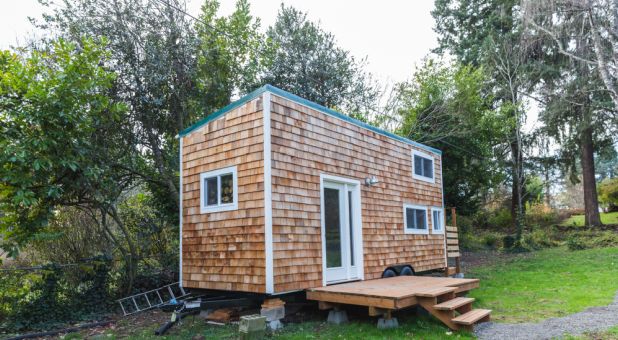
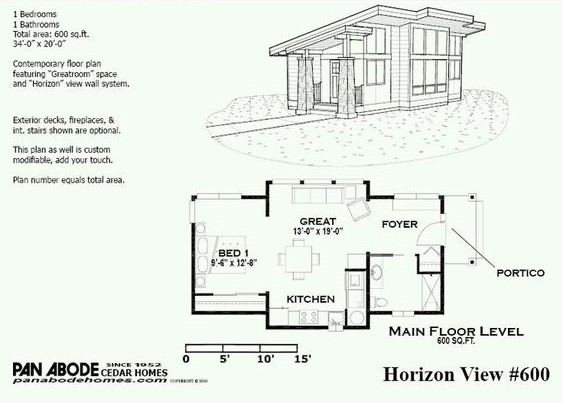
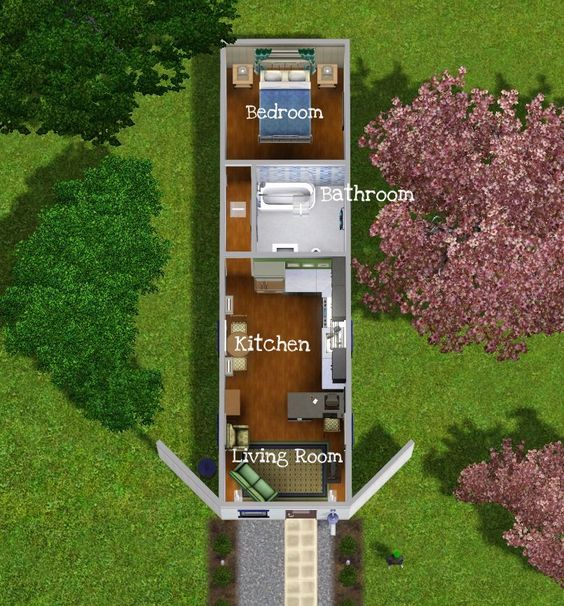


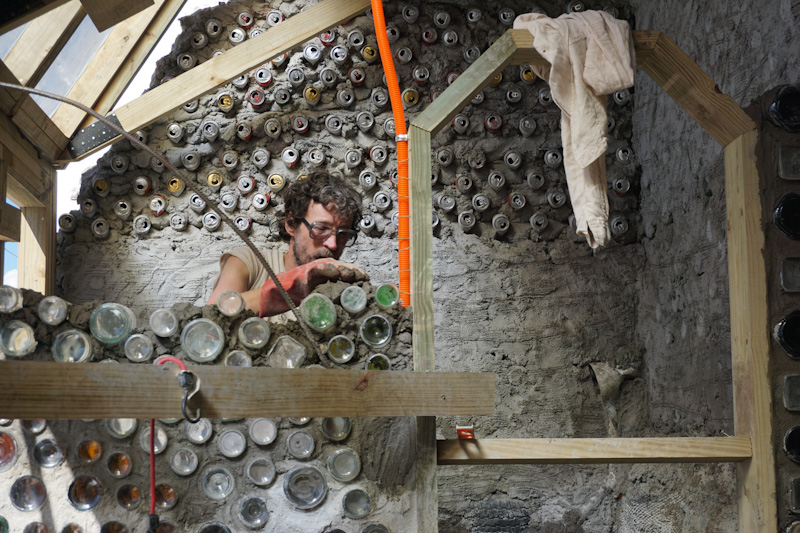

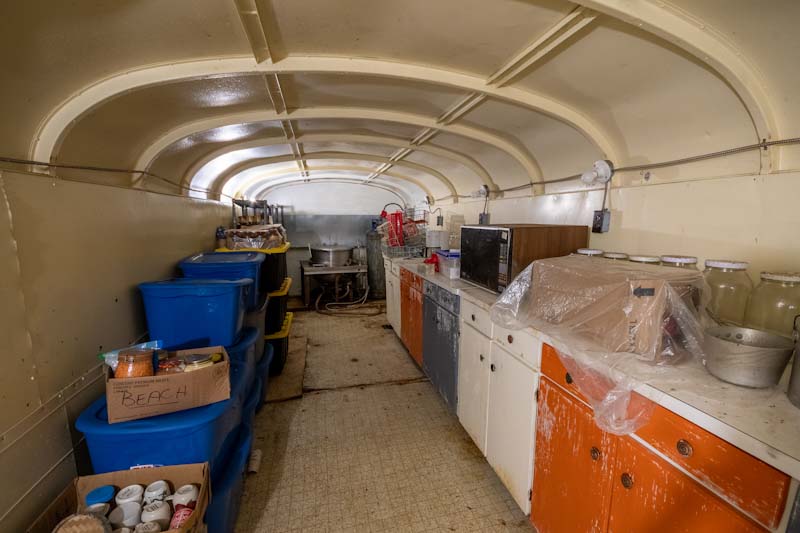

SkiptheBS | August 19, 2018
|
Two of the worst problems with both tiny houses and campers are lack of a firm foundation and lack of a second door. These make them subject to the most common SHTF scenarios: fire and windstorms. Not all windstorms are predictable or cyclonic. Straght line winds have been known to topple loaded semis. Best case is to have a second safety door on a tiny house and to keep a bug out camper or van, although this is an expense.